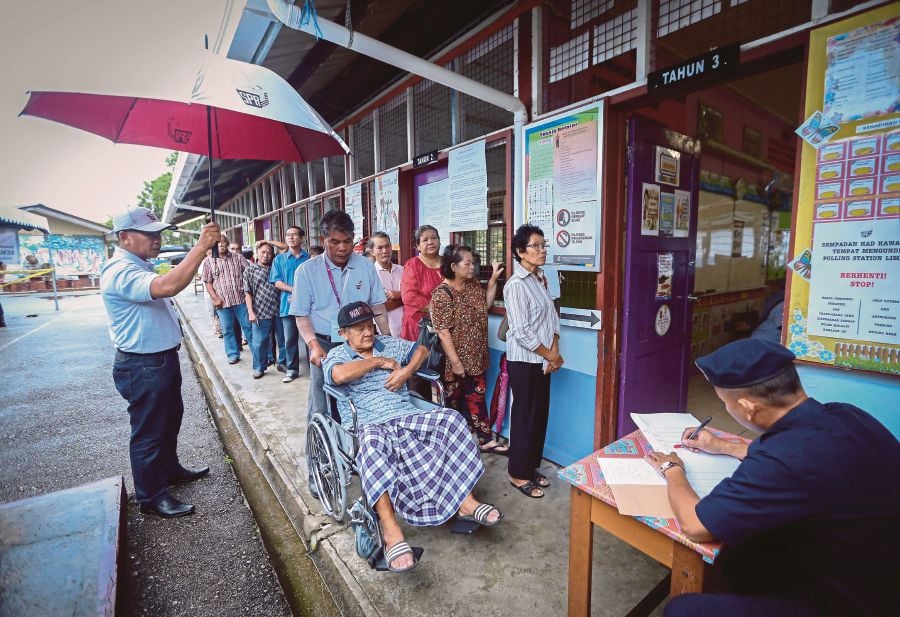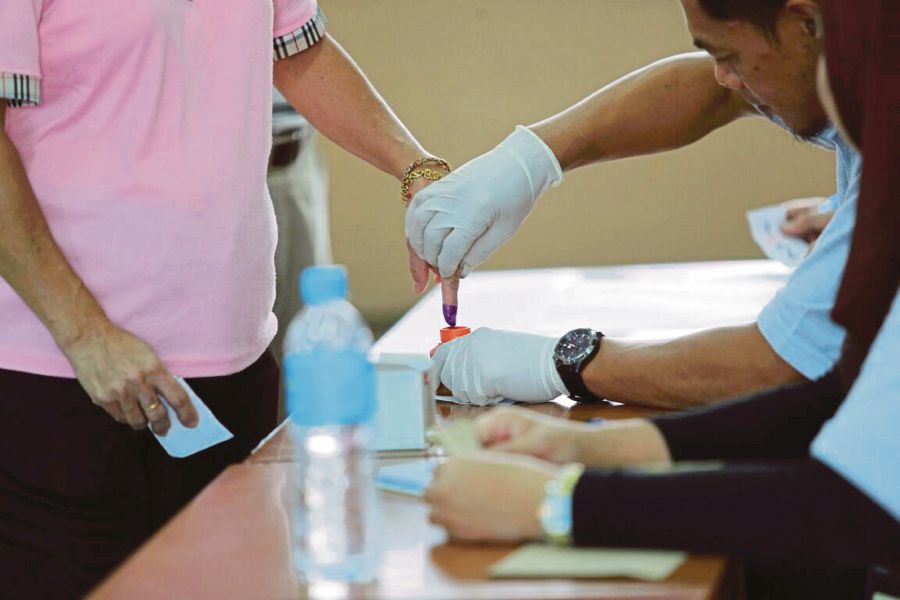KUALA LUMPUR: LESS than half of the six million people expected to register as voters after the last election will be on the next electoral roll.
Until July this year, 3.7 million people, mostly youth aged between 21 and 30, have yet to join the ranks of the 14.6 million voters.
Election Commission (EC) chairman Tan Sri Mohd Hashim Abdullah said there were five factors for them not exercising their democratic right.
These were the belief that the polling system was not in line with religious concepts, ignorance of the importance of voter registration, preference to voice their sentiments through social media or demonstrations instead of the ballot box, political fatigue, and lack of awareness about registration facilities, he said.
There are also those influenced by certain parties to paint the commission as allegedly corrupt or partisan, although such an issue is not a major factor.
“Such (negative) views about the EC are part of the propaganda by certain parties. All of them are not true,” Hashim said.
In his recent blogpost on sskeruak.blogpost.com, Umno treasurer Datuk Seri Salleh Said Keruak said explanations had to made to the young to correct their perception about politics and to stop them from remaining politically passive.
Salleh said he was sad that the statistics showed many who did not register as voters were 21 years old.
“I think it’s a loss if young people are politically passive.
“If their non-interest in politics is the factor, then their perception (about politics) needs to be corrected.
“Young people cannot go on like this as they will be the ones charting the country’s future.
“There is still time and the young need to be motivated to register as voters,” he said.
Salleh quoted the Merdeka Centre survey, which found the young being politically passive due to a number of factors, including being busy with work, fed up with the political games of the elders, distrust of politicians, and the feeling that voting would bring them no benefit.
“Another study by researchers from Universiti Kebangsaan Malaysia revealed the shocking factor of young people’s interests being neglected by politicians and their confusion over the political situation.
“They don’t trust the country’s political institutions. ‘
“They are fed up. Thus, the above views should be given attention.”
He urged political parties to campaign to get the young to be politically active because the country needed them for its future success as “young souls are strong, energetic and visionary”.

(NST File Pix) Voters lining up to exercise their electoral rights at the Tanjung Datu by-election in Sarawak in February.
Political expert Professor Dr Sivamurugan Pandian agreed that such was the long-term issue often overlooked and the setback lay in ratio imbalance between voters in neighbouring polling constituencies.
If people continue to disassociate themselves from the electoral process, the results could be just a collective waste of opportunities in charting the country’s path.
“The last redelineation was carried out in 2003, and another should have been implemented in 2013.
“However, the EC said the exercise in 2013 could not take place as the 13th General Election was just around the corner.
“The redelineation is now overdue and we have to implement it as soon as possible to fit into our geographic and demographic changes.”
Theoretically, the imbalance would lead to constant redelineation exercises and a split in voter bases.
“Certainly, (an imbalance will take place) as it depends on which constituency registers the most voters.
“And it is not just about numbers. The whole spectrum includes imbalance among gender and socioeconomic groups.
“The latter is particularly important to determine the background of voters, whether they are from the upper, middle or lower-income groups.”
The late United States president Grover Cleveland once said: “Your every voter, as surely as your chief magistrate, exercises a public trust.”
Cleveland, who was the US’s 22nd and 24th president, was expounding on the mandate given by the masses to their elected representatives.
The low number of voters due to non registration could mean the results are not a reflection of the majority’s wishes.
Hence, the low number of registered voters could easily lead to a question on the legitimacy of winning parties, Professor Dr Azizuddin Mohd Sani said.
“Ideally, the party that wins and fulfils the requirement to form the government, by and large, has received the mandate and is endorsed by eligible voters to set the direction of the state or country.
“If only less than 50 per cent of eligible voters turn up, then there will be a question of legitimacy. Regardless of which party wins and forms the government, do they truly represent the people’s confidence and wishes?”
Sivamurugan said democracy could only be realised through mass participation of the people, and it was a right exercised by mature nations.
“If you do not participate in one of the main pillars of the country’s democratic system, then you are losing your right to decide the type of government you want.
“One can always say that there is no guarantee that a registered voter will cast the ballot paper on polling day, but those who did not register will certainly not vote.”

(NST File Pix) A citizen has the right to vote and participate in the conduct of public affairs through the ballot box.
Business consultant Mark Looi, 34, believes that people play a large role in determining the country’s future.
Looi, from Petaling Jaya, puts his faith in the democratic system, without veering too much into the political bedlam that colours most of the media headlines today.
“I look into the policies adopted by the government. For me, as a voter, that is the main factor to be considered before I reach a decision.
“I do not really look into political sentiments.
“The government with the best policies in managing the country and its people gets my vote.
“As voters, we care about our nation and future.
“Voting is the most direct way for a citizen to express political preference.
“Rather than spending time simply making noise (talking about political issues or sentiments) or attending political rallies, it is better to support your stand by voting.”

No comments:
Post a Comment